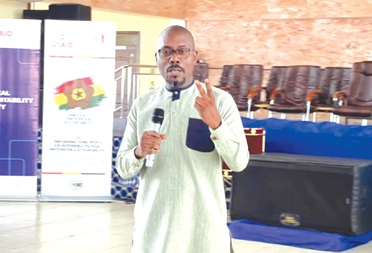
NCCE educates Ashaiman youth on civic rights
The Ashaiman Municipal Directorate of the National Commission for Civic Education (NCCE) has held a forum to educate out-of-school youth in the Ashaiman Municipality in the Greater Accra Region on the upcoming elections, in partnership with the International Foundation for Electoral Systems (IFES).
Under the USAID-funded Political Accountability Activity (PAA) geared towards empowering in-school and out-of-school youth with the requisite knowledge to prepare them towards the upcoming December 7 general election, the programme was on the theme: “Empowering young people for responsible participation and accountability’’.
The participants were taken through topics, including identifying false information and promoting facts, importance of youth in Ghana, governance and corruption, money in politics and conflict, violence, among others.
The participants, drawn from various groups in the 15 electoral areas of the municipality, were made up of okada riders, dressmakers, tailors, among others.
The project was aimed at strengthening citizens’ knowledge of political finance, misinformation, disinformation, electoral violence and abuse of state resources to create a peaceful and credible election in 2024.
The political accountability programme is also to empower the youth with knowledge and motivation to actively engage in the political process and exercise their democratic rights and responsibilities effectively.
These engagements are being piloted in six districts, including Ashaiman Municipality, and involve five in-school activities and five Town Hall meetings with support from the US Agency for International Development (USAID) and its partners, the Consortium for Elections and Political Process Strengthening (CEPPS), made up of IFES, the International Republican Institute (IRI), and the National Development Institute (NDI).
Vote buying
Addressing the participants, the Greater Accra Regional Director of NCCE, Mawuli Agbenu, stressed that all kinds of elections in Ghana were the civic responsibility of Ghanaians who qualified to vote and, therefore, voters were not to sell their votes, neither were politicians supposed to buy the votes as was being alleged.
![]()
The participants in the forum
Mr Agbenu, who was also the facilitator at the youth engagement programme, said even though the nation had had eight successful elections in the country in the past, it was not guaranteed that the December 7 election would be successful.
Democracy and voting
“Politicians giving money to the electorate for votes and the electorate demanding money for their votes is not the way to go. Democracy and voting should be a civic duty and responsibility and not vote selling and vote buying as we are hearing is going on.”
“We as a National Commission for Civic Education, it is our civic duty to educate the general public, and for that matter the electorate and the youth as you are seated here now, to discourage you from such unhealthy practices of vote selling,” Mr Agbenu emphasised.
He said in Ghana the youth formed the largest demographic group, “and this year we have a huge number of such groups and this particular programme for this year’s election is geared towards the youth to ensure that the commission sensitises the youth to money in politics (monetisation) and misinformation, disinformation, hate speech and all others and to ensure the youth do not make themselves available for electoral violence’’.
NCCE Municipal Director
The Ashaiman Municipal Director of NCCE, Salvata Mawulorm Koku, said the youth were the future leaders and politicians used them to foment trouble and, therefore, the Commission would continue to ensure the youth know their civic responsibility.
She said Ashaiman was noted for violence but the commission would this time around ensure the youth stayed clear from violence so the existing peace they were enjoying could continue.
The Senior Project Officer of IFES, Bright Agbagba, urged the youth to ensure they participated in the electoral system responsibly and demanded accountability from politicians and other stakeholders, adding, “tolerate each other in spite of religious and ethnic differences”.
